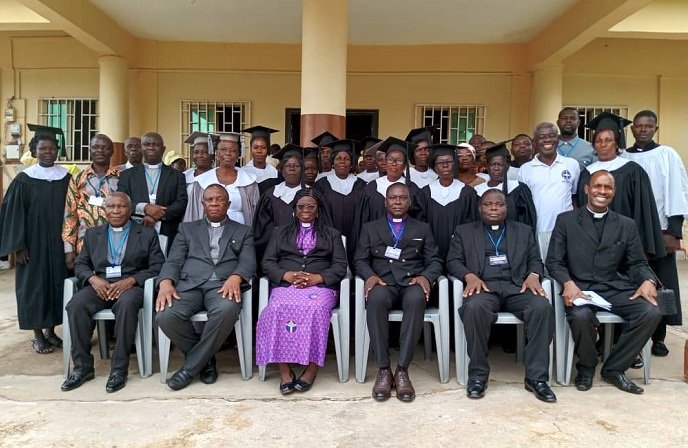News
‘Church must lead crusade to protect environment’

The synod Moderator of the Dayi Presbytery of the Evangelical Presbyterian (EP) Church, Ghana, Reverend Wisdom Seloame Alorvi, has reminded the church and Ghanaians of their responsibility to protect the environment, which is the creation of God, and not to destroy it.
Reverend Alorvi stated that God created the world and saw all that he created, and said it was very good – Genesis 1:31, and stressed that it was the duty of people who benefited from the creation of God to protect the environment, saying if they could not protect it, they should not destroy it.
The Moderator gave the reminder at a day’s special synod of the Dayi Presbytery of the EP Church Ghana, at Vakpo in the North Dayi District of the Volta Region on the theme: ‘Care for Creation; The Task and Mission of the Church’.
The Synod deliberated on the activities of the church in propagating the gospel to win souls for Christ, and the role of the church in the protection of the environment, which is God’s creation, including our forests, water bodies which are crucial to the survival of the human race.
Additionally, Rev. Alorvi stressed that if God said in His word that everything that he created was very good, then it was the duty of men to take good care of the creation of God, which must be seen in the collective mission and task to care for them and not to destroy them.
He underscored the importance of the church to propagate the gospel alongside educating the people on the need to protect the environment, which was full of God’s creation, saying “any church that did not take good care of God’s creation would be deemed as ignorant of their mission.
Rev. Alorvi observed that Ghanaians belonged to one church or the other, and it is important that the church educate and encourage their members to protect the environment, adding that the inability of the church and Ghanaians to protect the environment would be regarded as negligent of their God-giving task.
Moreover, he said that “if the last tree dies, the last man dies,” highlighting the critical connection between the human race and the ecological world, particularly our forest resources, which underscored the fact that the survival of people was fundamentally linked to the health and well-being of the environment.
Rev. Alorvi also stated that the above phrase raised ethical issues about the responsible use of natural resources and the impact of human activities on the environment, stressing that after all, the very survival as a people largely depended on how the environment was cared for.
The Moderator, therefore, called on Ghanaians to stop the wanton pollution of the environment, plant more trees, dispose of refuse properly, and stop illegal mining popularly called ‘galamsey’ and other human activities that threatened the sustenance of the environment.
From Samuel Agbewode, Vakpo
News
Man sentenced to 25 years for robbery at Manso Akwasiso

A 30-year-old man has been sentenced to 25 years imprisonment with hard labour by the Bekwai Circuit Court for his role in a 2022 robbery at a mining site at Manso Akwasiso in the Ashanti South Region.
The convict, Dominic Ofori, also known as Fanta, was arrested on 16th February 2026 after years on the run. He pleaded guilty before the Bekwai Circuit Court to robbery contrary to Section 149 of the Criminal Offences Act, 1960 Act 29, and was accordingly sentenced to 25 years imprisonment with hard labour.
On March 20, 2022, the Manso Adubia District Police received intelligence that a group of armed men from Manso Abodom were planning to attack a mining site at Manso Akwasiso to rob the owner of gold concentrate. Acting on the information, police mounted a coordinated operation and laid an ambush at the site.
At about 5:30 pm the same day, four-armed men arrived at the site, fired indiscriminately, and robbed the miners of their gold concentrate. The police team on surveillance intervened, resulting in an exchange of gunfire.
Three of the suspects, Abu Abubakar, Musah Latif, and Gideon Takyi, sustained gunshot wounds and were pronounced dead on arrival at St Martins Catholic Hospital at Agroyesum. Dominic Ofori escaped at the time but was later arrested and put before the court.
The Ashanti South Regional Police Command has assured the public of its continued commitment to combating violent crimes and bringing offenders to justice.
News
Ashanti police arrest man for publishing false news on TikTok

The Ashanti Regional Police Command has arrested 45-year-old Isaac Boafo, also known as “Duabo King,” for allegedly publishing false news intended to cause fear and panic.
Police said the arrest follows a viral TikTok video in which Boafo claimed that four officers at the Central Police Station in Kumasi engaged in inappropriate conduct with commercial sex workers during night patrols in Asafo.
Officers from the Police Intelligence Directorate (Ashanti Region) apprehended Boafo after receiving intelligence about the video.
During questioning, he admitted to creating the video to attract views and engagement online, and acknowledged that he could not prove the allegations.
Boafo also admitted making comments about the President of the Republic for content purposes and could not defend those statements.
He has been formally charged and is in detention as investigations continue.
The Ashanti Regional Police have warned the public against publishing or sharing false information on social media, noting that such acts can cause fear, panic, and damage reputations.
They said anyone found engaging in similar conduct will face legal action.
By: Jacob Aggrey






